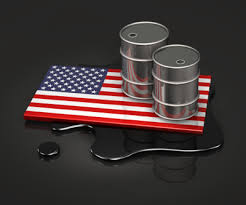
As the domestic production in United States soars, a weaning off OPEC crude and a decline in the biggest oil user's reliance on imports are highlighted by President Donald Trump's proposal to sell half of the U.S. strategic oil reserve.
In heavily guarded underground caverns in Louisiana and Texas, about 688 million barrels of crude is stored as part of the U.S. Strategic Petroleum Reserve (SPR) SPR-STK-T-EIA, the world's largest.
After the Arab oil embargo caused fears of long-term spikes in motor fuel prices that would harm the U.S. economy, Congress created it in 1975.
Proposal to start selling SPR oil in fiscal 2018, which begins on Oct. 1 would be presented by the White House budget, which will be delivered to Congress on Tuesday. Documents released by the administration showed that the sales would generate $500 million in the first year.
Peaking at nearly $3.9 billion in 2027, and totaling nearly $16.6 billion from 2018 to 2027, sales from the reserve would gradually rise over the following years.
It sends a powerful signal about the United States' decreasing need for imports as its own production reaches new highs, although the figure is equivalent only to the output of a mid-sized field.
From as high as 10 million bpd in the middle of the last decade. C-IMP-T-EIA, imports have fallen sharply - sometimes to as low as 7 million bpd, since the U.S. shale oil boom began at the start of this decade.
"The United States definitely don't need as much SPR as they have now lower imports," said Amrita Sen of the consultancy Energy Aspects, noting that the drive to reduce the SPR had started under former President Barack Obama.
"While the headlines may be bearish, not only is this just a proposal that is unlikely to make it past Congress, it is also phased over 10 years ... So we do not see this as bearish for fundamentals even though the headlines won't help," she added.
The plan, if implemented, would not add dramatically to global oversupply, agreed PVM brokerage.
It is widely expected that Organization of the Petroleum Exporting Countries (OPEC) will extend production cuts by nine months to March 2018 to help the market rebalance when it meets this week. U.S. is not a member of OPEC.
Sales would result only in a small amount of additional supply in coming years, agreed Olivier Jakob from Swiss-based Petromatrix consultancy.
"To maximize budget revenues we would suggest to the White House to copy for once what Mexico does, and to use any price support provided by OPEC cuts to hedge the forward release of SPR barrels," he said.
A significant drop in stock from current record levels of 3 billion barrels in the next few months is seen by the West's energy watchdog, the International Energy Agency (IEA which has added that oil market rebalancing was on the way.
Strategic stocks equal to 90 days of the previous year’s net oil imports are required to be kept by the members of the IEA, which counts the United States as a member.
(Source:www.reuters.com)
In heavily guarded underground caverns in Louisiana and Texas, about 688 million barrels of crude is stored as part of the U.S. Strategic Petroleum Reserve (SPR) SPR-STK-T-EIA, the world's largest.
After the Arab oil embargo caused fears of long-term spikes in motor fuel prices that would harm the U.S. economy, Congress created it in 1975.
Proposal to start selling SPR oil in fiscal 2018, which begins on Oct. 1 would be presented by the White House budget, which will be delivered to Congress on Tuesday. Documents released by the administration showed that the sales would generate $500 million in the first year.
Peaking at nearly $3.9 billion in 2027, and totaling nearly $16.6 billion from 2018 to 2027, sales from the reserve would gradually rise over the following years.
It sends a powerful signal about the United States' decreasing need for imports as its own production reaches new highs, although the figure is equivalent only to the output of a mid-sized field.
From as high as 10 million bpd in the middle of the last decade. C-IMP-T-EIA, imports have fallen sharply - sometimes to as low as 7 million bpd, since the U.S. shale oil boom began at the start of this decade.
"The United States definitely don't need as much SPR as they have now lower imports," said Amrita Sen of the consultancy Energy Aspects, noting that the drive to reduce the SPR had started under former President Barack Obama.
"While the headlines may be bearish, not only is this just a proposal that is unlikely to make it past Congress, it is also phased over 10 years ... So we do not see this as bearish for fundamentals even though the headlines won't help," she added.
The plan, if implemented, would not add dramatically to global oversupply, agreed PVM brokerage.
It is widely expected that Organization of the Petroleum Exporting Countries (OPEC) will extend production cuts by nine months to March 2018 to help the market rebalance when it meets this week. U.S. is not a member of OPEC.
Sales would result only in a small amount of additional supply in coming years, agreed Olivier Jakob from Swiss-based Petromatrix consultancy.
"To maximize budget revenues we would suggest to the White House to copy for once what Mexico does, and to use any price support provided by OPEC cuts to hedge the forward release of SPR barrels," he said.
A significant drop in stock from current record levels of 3 billion barrels in the next few months is seen by the West's energy watchdog, the International Energy Agency (IEA which has added that oil market rebalancing was on the way.
Strategic stocks equal to 90 days of the previous year’s net oil imports are required to be kept by the members of the IEA, which counts the United States as a member.
(Source:www.reuters.com)





